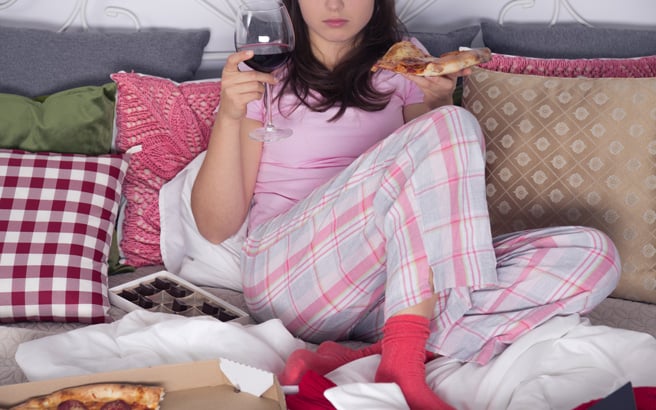 It’s not surprising that during the coronavirus pandemic, some people are looking at ways to cope with uncertainty, worry or anxiety – and this can mean turning to food for comfort or alcohol to relax. But Matt Lambert, our Health Information Officer, gives us some healthier ways of coping with challenges.
It’s not surprising that during the coronavirus pandemic, some people are looking at ways to cope with uncertainty, worry or anxiety – and this can mean turning to food for comfort or alcohol to relax. But Matt Lambert, our Health Information Officer, gives us some healthier ways of coping with challenges.
Over time, stress can have a significant effect on our mental and physical health – it can cause mood swings, agitation, anxious thoughts, muscle tension, increased heart rate and blood pressure, and disturbed sleep. The good news is that there are many positive things we can do to help ourselves.
Alcohol and stress
People who feel stressed may drink more. Although alcohol initially helps us to relax, after drinking you can feel even more anxious. People may also be drinking more alcohol to relieve the boredom of being at home without much to do.
Alcohol can also be surprisingly high in calories and offers very little of the nutrients your body needs. Drinking alcohol can also cause us to be tempted by foods high in fat and salt, leading us to make unhealthy choices. Use our alcohol calorie calculator to find out how many calories are in different alcoholic drinks.
Alcohol can also be really disruptive to our sleep. While alcohol can help us get to sleep quicker, it can lead to frequent waking. This in turn leads to tiredness the following day which can make feelings of anxiety and worry worse. One of the best things we can do to look after ourselves at this time is to try and get a good night’s sleep.
Tips to cut down on alcohol
- Alternate alcoholic drinks with water or non-alcoholic drinks.
- Dilute your drinks – for example, rather than pouring yourself a large glass of wine, pour half and fill the remainder of the glass with soda water or sugar-free lemonade.
- Avoid eating salty snacks – they can make you thirsty and encourage you to drink more.
- Don’t stock up on alcohol. The more you have in the house, the more likely you are to drink.
Try our mocktail recipes

Food and stress
When we are feeling stressed, one of the first things that can change is our eating habits. We don’t always eat just to satisfy physical hunger; many of us also turn to food for comfort and stress relief. There are many psychological reasons why we turn to food when feeling stressed; eating can serve as a welcome distraction from the challenges of life and a coping mechanism during uncertain times.
When we turn to food in times of stress, we typically go for junk food and other unhealthy food high in saturated fat, sugar or salt – we may also eat more than we normally would which can contribute to weight gain. Overeating isn’t the only stress-related behaviour that can increase our weight. Stressed people can also lose sleep and exercise less – which may contribute to excess weight – which we know is not great for our overall health. Try some of the tips below to help manage your stress without turning to unhealthy food or alcohol.
Tips to help manage stress
- Make exercise a daily priority. Physical activity can do wonders for our mood, energy levels, and can help ease feelings of stress. Try some of these to get you started.
- Try to maintain a healthy, balanced and varied diet – good nutrition is important not just for our physical health but also our mental health. Aim to limit consumption of food high in saturated fat, sugar and salt.
- Try doing something to distract yourself if feeling stressed such as talking to a friend or family member, playing a game, going for a walk, or doing an exercise class. Or how about starting a new hobby?
- Make time for relaxation. Take at least 30 minutes each day to relax and unwind. Meditation, yoga, tai chi and other mindfulness-based exercises and programmes can help calm your mind.
- Keep to a regular sleep pattern. Try to get between 7–9 hours of sleep each night. Worry can disrupt sleep and lack of sleep can worsen mental health.
- Try to avoid any triggers for your stress, such as social media.

- Updated April 2021

